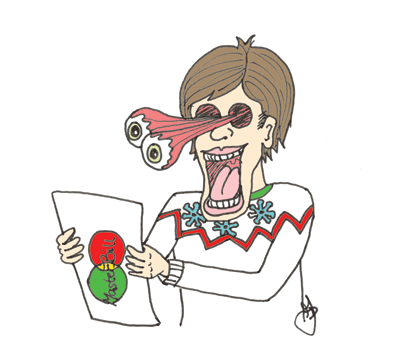Ho-Ho-Holiday debt
We’ve all been there, finally getting around to opening that first credit card statement after the holiday spending  spree. The task has probably been put off for a few days, or weeks, since the total amount owing is enough to make your eyes pop out of your skull. However, for many students, this is a regularly scheduled event to dread just after ringing in the New Year.
spree. The task has probably been put off for a few days, or weeks, since the total amount owing is enough to make your eyes pop out of your skull. However, for many students, this is a regularly scheduled event to dread just after ringing in the New Year.
Debt is something that plagues many students, especially this time of year. Like English major, Kayla Teodoro, some students need to improve on essential money-managing skills.
“Sometimes you’re bored, and you go into a store and you [make purchases] on your credit card and you don’t even think about it,” Teodoro, a St. Mary’s University College student, said.
In having to fund her own post-secondary education, Teodoro’s two credit cards and student line of credit have found themselves maxed out as the holidays wrapped up.
She mentioned that she tends to finish her holiday shopping in October, but because she is done by the time December rolls around, she ends up finding more and more things to add to her gift list as she frequents the malls with friends.
“This year, I didn’t do as bad as last year in holiday spending,” Teodoro explained. “I spent like $600 and that’s just buying for my mom, my dad, my brother, and a couple of close friends.”
Tracy Watson of Alberta’s Money Mentors mentioned that she sees more business in the month of January. She credits the increase in clients to the “post-holiday credit card blues”, as well as New Year’s resolutions.
“[People] want to pay off their debts and perhaps [look for] a lifestyle change to manage their money, so they call us and are looking to get some information,” Watson said.
Watson offers a few tips for dealing with the debt that has been topped off by the festive season, primarily emphasizing awareness of how much money is owed and to whom. One major tip she offers is the creation of spending plans to see where money can be saved.
“It’s mainly the miscellaneous stuff that catches up with you,” Watson added. There are few university students who are unfamiliar with a couple of dollars spent here and there on coffees or lunches or retail therapy to de-stress.
Anjie Fitzgerald, manager at the Debt Reduction Centre, reiterated the importance of “learning to live within your means.” She explained that a major cause of debt is impulse buying.
“[The retailers] put the impulse items right in front of your face,” she noted. “People just can’t help themselves.”
Teodoro recognizes that she too suffers from the influence of our consumerist culture. She mentioned that she is not a stranger to going over the top and purchasing an item, such as a shirt, in multiple colours if she likes it enough.
However, as her debt is catching up to her, she has realized the importance of re-evaluating whether her purchases are made out of necessity or out of pure want or boredom.
“If I want a new shirt or something, I’ll walk around the store with it, then I’ll try it on, and I’ll ask myself, ‘Do I really need this?’” she said.
Fitzgerald, explained that she personally tries not to shop at stores that do not give refunds, because if you are able to return items, you are better able to deal with debt should an emergency arise where one needs money.
She also suggested stapling receipts to credit card bills or statements in order to keep track of what is being spent, as well as to ensure that there are no discrepancies in the transactions reported.
Watson mentioned that having credit cards is not necessarily a bad thing as long as it is manageable. She explained that, “once people lose control, that’s when it becomes a problem.” Having noted that it is best to keep cards to a minimum and to pay them off 100 per cent after the 30-day period.
Whether one is in debt or not, Watson expertly emphasizes that as students, “this is the prime time to be smart with money management.”
“It’s good to be financially fit, as well as physically and mentally fit,” she concluded.




